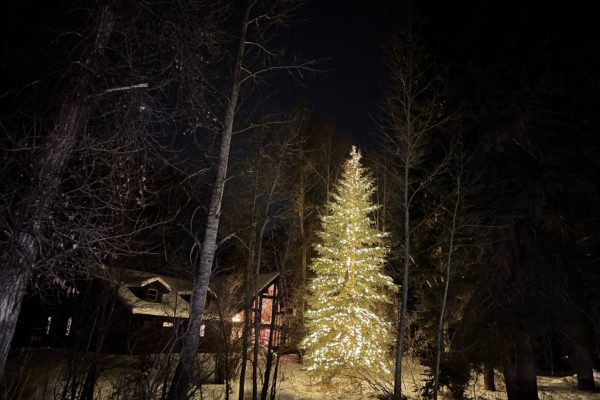by Melissa Elliott
This article was originally published in PCJH’s Winter 2022 Pinnacle, “Bursting Into Songs of Joy”
It has become a little tradition with myself that every year on an evening in December, I will dust the snow off of my car and take a drive around the neighborhoods to look at Christmas lights with the heat on high, playing Mariah Carey’s 1994 album “Merry Christmas” at (almost) full volume. After belting my heart out to the second track, “All I Want for Christmas is You,” I take a breath and listen to song number three – “O Holy Night.” By this time, the cab of my car is pleasantly warm and the lights on the houses seem to sparkle a little brighter. My speakers offer the surround sound of a gospel choir, church organ, and Mariah Carey’s voice piercing through the atmosphere. When she flips into her falsetto on the final “divine,” I have to pull over because at this point I am undoubtedly in tears.
There is something about Mariah Carey’s gospel version of “O Holy Night” that moves me so deeply, yet even when I sing it in its hymnal form on Christmas Eve I can’t help but get misty eyed. The original composition has a 6/8 feel with an arpeggiated accompanying melody, creating a gentle swaying sensation, like rocking a newborn baby. The melody builds like you’re climbing up a mountain, the peak of the song happening at the lyrics “divine,” “King”, and “power and glory.” The first two verses of the song tell of the events that transpired in the Christmas story and the third verse (my favorite verse) encapsulates the message of Jesus’ life – “truly He taught us to love one another; His law is love and his gospel is peace.”
The origins of “O Holy Night” come from Roquemaure, France in 1843, where a parish priest asked poet Placide Cappeau to write a Christmas poem to celebrate the renovation of the church’s organ. Cappeau’s poem “Minuit, chrétiens” was put to music by composer Adolphe Adam, and“Cantique de Noel” premiered on that sparkly new organ at a Midnight Mass just a few weeks later. The song grew in popularity and was sung throughout France, Europe, and eventually reached the Americas where Unitarian Minister John Sullivan Dwight translated and adapted it into English in 1855. “O Holy Night” was an international smash hit, but the creators didn’t even celebrate Christmas! Adolphe Adam was Jewish and Placide Cappeau was an atheist. When the church learned this information they considered the song unfit for services and banned the song from being sung in churches.
Over in America, John Sullivan Dwight was translating the song to English. Dwight was an abolitionist who deeply resonated with that third verse I mentioned earlier – “Chains shall He break, for the slave is our brother; And in his name all oppression shall cease.” He published his version of “O Holy Night” and it became a song of hope and peace during the American Civil War in the fight for freedom for enslaved people
Back in France, people were singing “Cantique de Noel” quietly in their homes because it was still banned from mass. Legend has it that on Christmas Eve of 1871 in a lull in battle during the Franco-Prussian war, French soldiers began singing “Cantique de Noel” from the trenches. The opposing German army heard their song and responded with a song by Martin Luther. Allegedly, all battle ceased for 24-hours so soldiers could celebrate Christmas, putting “O Holy Night” out of exile and back to Midnight Masses in France. Prior to writing this, my Christmas time car-rides melting to Miss Carey’s whistle tones was all I knew about
“O Holy Night.” I’m surprised and curious about its deep and complicated history (side note and fun fact: it was the first song to ever be played on radio airwaves!). I think the song’s escalating melody, inspiring lyrics, and its historical significance is the perfect message of Christmas—a message to treat one another with love and respect. The love of Christ transcends all race, gender, religion, nationality, status… so we must choose to live in peace and allow for the love of Christ to flow through us each and every day of the year.
“Sweet hymns of joy in grateful chorus raise we
Let all within us Praise His holy name
Christ is the Lord; O praise his name forever!
His power and glory evermore proclaim.”


